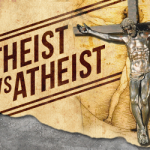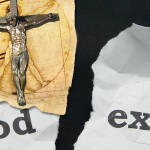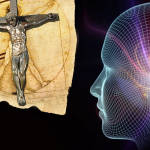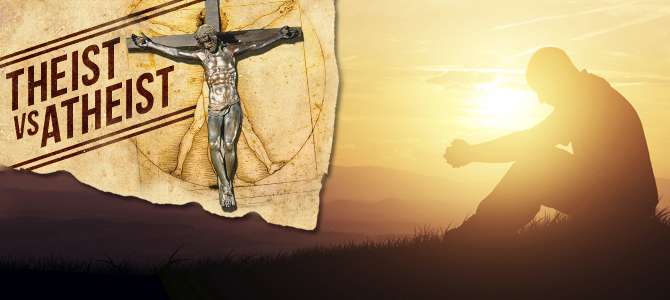A seven-part series of articles by two columnists, John C. Wright and Stephen R. C. Hicks, in which they debate key issues in religion.
1. Is Religion Worth Arguing About?
 Stephen Hicks’s opening statement. John Wright’s opening statement.
Stephen Hicks’s opening statement. John Wright’s opening statement.
2. Are Reason and Faith Compatible?
Stephen Hicks’s statement. John Wright’s reply.
3. Can the Existence of God be Proven (or Made a Reasonable Hypothesis)?
 John Wright’s statement. Stephen Hicks’s reply.
John Wright’s statement. Stephen Hicks’s reply.
4. Is Religion Necessary for Personal Morality?
John Wright’s statement. Stephen Hicks’s reply.
5. Does the Meaning of Life Depend on an Afterlife?
 Stephen Hicks’s statement. John Wright’s reply.
Stephen Hicks’s statement. John Wright’s reply.
6. Is Religion Good or Bad for Politics?
John Wright’s statement. Stephen Hicks’s reply.
7. On Balance, Has Religion Been Good or Bad for Humanity?
John Wright’s conclusion. Stephen Hicks’s conclusion.
The Theist vs. Atheist series was originally published in 2015 at EveryJoe. Publisher: Alexander Macris. Editor: Kori Ellis. The debate series was also translated into Portuguese by Matheus Pacini.
Here also is the seven-part series in one PDF file.

RE: Reason and Faith
Pope John Paul’s take is this…
Christianity is both Faith and Reason… reason alone leads to relativism and faith alone leads to superstition. FYI… the atheist “faith” is spontaneous; universe, life, and conscience.
The debate is not Faith vs Religion… it’s Faith vs faith and science vs science (worldviews collide).
We always look at the debate Atheist vs Theist by focusing on the later. I was a member of the Skeptics until a decade ago, which is strongly linked to the Atheist community. A few lines…
The lack of a moral code
If you’re not compelled by the rule of nature or any external rules, but define your own rules as the social constructivists do, then you have no rule, no value at all because you can always make one up to escape your responsibilities.
You got to have rules
Theists have a set of values from their scripture to guide them. It is said that non-theists, in a very broad sense, don’t have rules. That’s not correct, they are fully aware of the need to have a set of core rules. The reason why they don’t advocate for it, which explains why they don’t have rules as a group, is that they think that each individual has to find its own set of rules. At the same time, they hope that the rules they define will match those defined by all other individuals to have a functioning society. It doesn’t work. There are several reasons for that, for example, it’s not easy to find working rules. We get ours from previous generations, which themselves got them from previous generations. It is a slow process that works by addition and correction. Another example: the need for coordination implies that the rules are identical and understood the same way. It can’t work without a group consensus, but then you have to state the rules as a group. However, when it comes to the skeptic community (most are atheists), there is another reason. They do not want to ask their members to adhere to a specific set of rules. Some use that excuse to avoid having their ideology exposed and others because a few rules would be the same as the theists, and that’s too much to ask. Understandable, but you got to have rules.
The needs of rules: An evolutionary perspective
As living beings, we have needs (eat, sleep, reproduce) and there is the world. To satisfy those needs we have to interact with that world, composed of the environment, other life forms, members of your species, and our self. You need to have a set of rules to interact with that world to satisfy your needs because that world has its own rules and if you ignore them you die. You got to have rules to navigate in an ocean of rules that the universe itself needs to function. The more optimize your interactions, the better the rules. The best rules are transmitted from generation to generation and become moral rules.
The lack of a moral code: The case of the skeptic community
This chapter is a direct continuation of the discussion about the lack of a moral code, taking the Skeptic movement as an example, to show how the collectivists use the void of a moral code to infiltrate and corrupt all movements.
A crack between non-theists
After the year 2000, (hard to point at a specific date when it comes to social changes), a crack started to appear among the atheists, and there is something to learn from that story because the crack has revealed a dark place, carefully hidden. The crack is about the connection between some of the principles of the great religions, and the natural/Darwinian rules. Being an atheist was becoming problematic. For example, the great religions are based on a clear distinction of the role of men and women, and evolutionary theory shows us clearly that they differ. To treat them differently to optimize their potentiality might not be a bad idea. The crack is not the observation of convergence between religion and evolution, but from a hard-core atheist standpoint, to acknowledge that great religions might have a point based on a keen observation of human nature. But that crack hides a dark place. Those who have pushed the atheists to reject any valid points of the great religions were not exactly hardcore atheists, but people who embraced at least one of the ideologies linked to irrationalism. The problem is that any of those ideologies, sooner or later, oppose reason and science, and subsequently individualism, free speech… What a surprise.
It was not obvious, to anyone what was happening. We didn’t even know that there was a crack, to begin with. We thought we were all unified behind the banners of reason and science and that our differences were shallow, if any, and couldn’t overthrow our mission to push for reason and science. To never give a point to great religions was strange and I ask myself if the ‘new atheism’ movement was not created as a consequence of that crack.
The fall of the skeptic community
When I was part of the international group of skeptics and atheists, what stroke me the most was the lack of values. Individually, people have values, but the group was not promoting any values. This can be summarized by the emptiness of the answer to the question: what does it mean to be a skeptic/atheist? You wake up at 07:00 and then what? What is it that you do that defines you as a skeptic? The lack of values as guidelines for life is a call for the blank slate ideology, and that’s not restricted to the skeptic community. I have witnessed the takeover of the skeptic movement by the Marxist/postmodernist and its destruction. You find here the explanation of the de-platforming of Richard Dawkins by the New-York City skeptics, before his stroke. The lesson to learn is that any groups that do not promote a moral code or at least, a set of values should be considered dangerous or in danger to be taken over by the blank slate ideology. This just happened to the Linux community. As for the skeptics, some genuinely want to help the society to have better tools, more freedom… but they are lost, when their movement is taken over by an ideology. They do not understand what is happening and do not know what to do. Even if some do, those who have taken control will swiftly expulse them from the organization by every means necessary. Ostracism is such a sweet sentence, to feel the power you have over people and tell them that they do not belong to this place anymore.
Thank you gentlemen for taking the time to put so much thought and enthusiasm into writing these articles, not to mention the skill and experience in your thinking and writing, which was absolutely prerequisite to producing such an enjoyable and thought-provoking series. I think your arguments are wonderful and both sides are worth paying attention to.
After reading these articles in their entirety, I must say that I am more compelled by the atheist-naturalist-philosophical argument, although strangely, I’ve never considered myself an atheist. Yet, when confronted by the theocratic certitude, despite what is still so unknown given our mere infancy in our evolutionary state of being, I’m compelled to side with the atheist’s position, out of my desire to learn and know the mind of “God.”
That being said, I’m more than willing to concede in the belief of a higher intelligence or entity akin to a Deistic / Pantheistic / Panpsychic nature that is beyond our cognitive ability or conscious self. Whether it is internal or external to our mind, or cosmos, who the hell knows… I’m OK with calling whatever it may be, God. The last thing I would ever do is to try to purposefully destroy one’s faith in what one calls God, or one’s faith in the immortality of the soul, or one’s belief that the only moral code is what was bestowed upon us by God, as professed in a particular religion. So long as their belief helps them get through life the best way possible for them, and in accordance with a set of values that are good and beneficial to society, then this is good and necessary.
For such certitude among the new generation of hard core atheists is proving to also harm our society, in my opinion, with their own form of zeal and dogmaticism. If only the Christian theist would or could present an argument without the dogmatic certitude, I think more atheists would be inclined to identify themselves differently, and both sides could learn to appreciate what the other has to offer.
Thanks for your very thoughtful comment, Christopher.
I think some of the answers to these questions show how difficult it is to have a serious discussion about religious topics, and it is the more untestable/unprovable questions. For example, with question #7, present some statistics on religions, economic development, crime, health, etc; give an interpretation; let the other person do the same. It’s straightforward. However, look at the initial answer to question #4: it is filled with poor analogies (eg, we understand how a train works and why the first car needs no pulling car. How is this at all a satisfactory explanation for the question of an original superhuman/supernatural universe creator?) and untrue statements, with conclusions being drawn based on those falsities, “We all are aware that we know the difference between right and wrong and that we commit wrong acts, …” One, there have been near-countless immoral acts by all populations throughout history. Two, the level of morality, empathy, and rationality of other animals is not zero, but it is different than humans and hard to measure. Three, an atheist’s expression of religious morality doesn’t conflict with “atheism”: there is no indisputable reason to think that rational self-interest/self-preservation is the highest value of atheists; sacrificing oneself to save another is a rare action; humans are more rational than other animals, but we’re not perfectly rational.
Like Christopher above, I think some sort of consciousness/design is clear (call it some blend of panpsychism and pantheism). From particle phenomena, to individual cells, to complex organisms, scientists have overused and overrated “randomness” (probably out of arrogance; ‘The Rainbow and the Worm’ is a fine book for demonstrating some biological organization/design). I have an “anti-faith,” anti-authoritarian disposition; I’ll follow evidence from sciences (mostly physiology/biology) and stay open-minded, but it’s frustrating to deal with some judgments if I am skeptical of large speculative leaps, which often occur in religious debates.
I’ve been a fan for years but only thought to check out the website today, after I listened to your talk with essentialsalts. Thank you for your work.